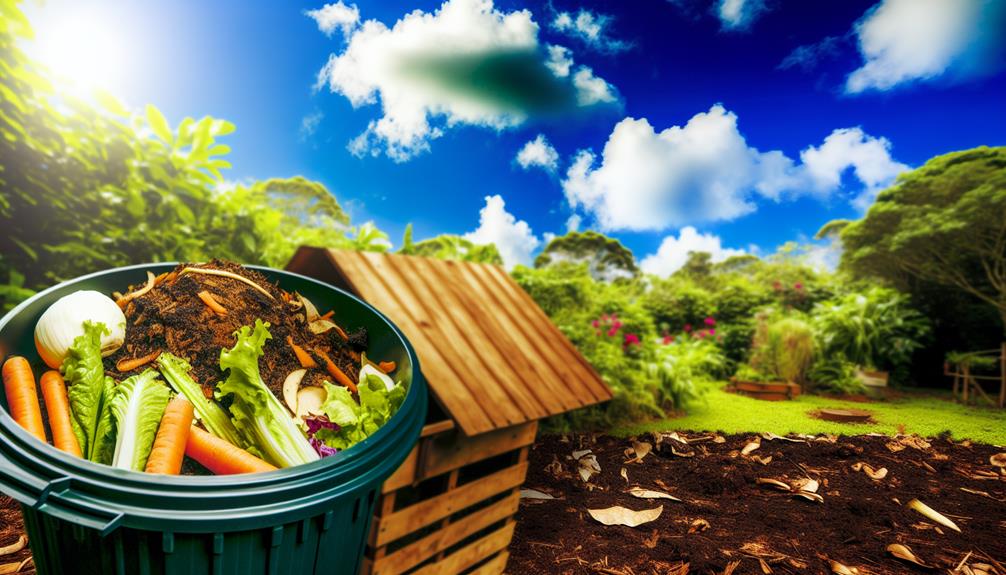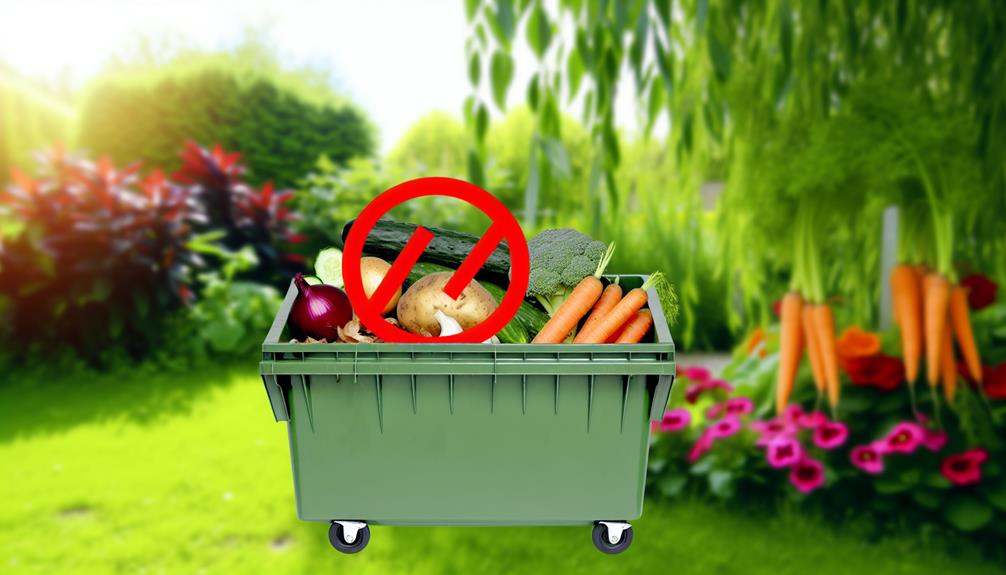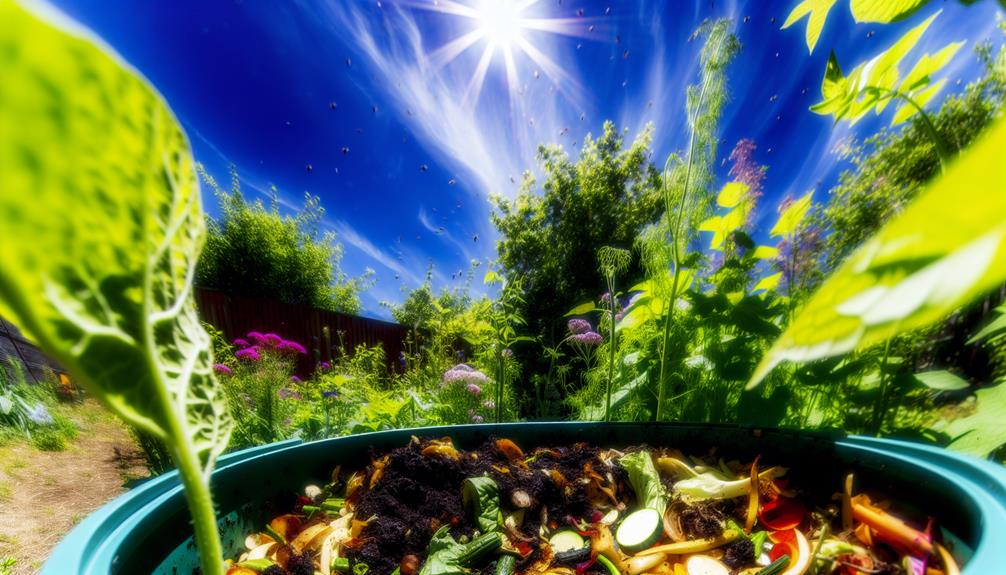

Yes, you can compost vegetables, which helps enrich your garden soil and reduce waste. Most scraps like peels, stems, and leafy greens break down well. Chop them into smaller pieces to accelerate decomposition. Avoid large pieces of root vegetables and strong-smelling items like onions and garlic.
Use a well-ventilated compost bin and balance green (vegetable scraps) with brown materials (dry leaves). Regularly turn the compost and keep it moist but not waterlogged. Monitoring and adjusting these factors will lead to successful composting. Stick around for more detailed tips on turning your kitchen waste into nutrient-rich compost.
Composting vegetables helps you reduce waste while enriching your garden soil with essential nutrients. By turning your kitchen scraps into compost, you’re not only minimizing the amount of trash heading to the landfill but also creating a rich, fertile soil amendment for your garden. This practice guarantees that valuable nutrients are recycled back into your garden, promoting healthier plant growth.
When you compost vegetables, you contribute to soil enrichment. Vegetable scraps break down into a nutrient-dense material that enhances soil structure, improves moisture retention, and fosters beneficial microbial activity. These factors collectively create an environment where plants thrive, leading to bountiful harvests and vibrant gardens.
Additionally, waste reduction is a significant benefit of composting. Instead of tossing vegetable peels, stems, and leaves in the trash, you’re repurposing them in a way that benefits both your garden and the environment. By doing so, you’re reducing your carbon footprint and promoting sustainability within your community.
Embracing composting helps you connect with like-minded individuals who value sustainability and environmental stewardship. It’s a simple yet impactful way to make a positive change, fostering a sense of community and shared responsibility for the planet.
Also Read: Can You Compost Body Wash?
You can compost a wide variety of vegetables, including peels, cores, stems, and leaves from your kitchen. Root vegetables like carrots, beets, and radishes are excellent candidates. Their peels and trimmings break down efficiently and contribute valuable nutrients to your compost. Chop them into smaller pieces to speed up the decomposition process.
Leafy greens such as spinach, lettuce, kale, and cabbage are also great for composting. These greens decompose quickly, adding essential nitrogen to your compost pile. Just be sure to mix them with ‘browns’ like dried leaves or paper to balance the carbon-to-nitrogen ratio.
Don’t forget about the less obvious parts of vegetables. Broccoli stalks, cauliflower leaves, and the outer layers of onions can all be composted. Even the tops and tails of root vegetables can go into the compost bin. Just remember to avoid large chunks, as smaller pieces break down faster.
Not all vegetables are ideal for composting, and some can even cause problems in your compost pile. To maintain a healthy and efficient compost, you’ll want to avoid certain types of vegetables. Here’s a list of vegetables you should consider taking extra care when adding:

Large pieces of root vegetables like potatoes and carrots can take a long time to break down. If you do add them, make sure to chop them into smaller pieces to speed up decomposition.
While some greens are great for compost, wilted greens like lettuce can become slimy and attract unwanted pests. It’s best to avoid these or make sure they’re well-mixed with dry materials.
These can be problematic due to their strong smell and potential to repel beneficial composting organisms. If you choose to compost them, do so with caution.
Any vegetable showing signs of disease should be kept out of your compost. Diseases can survive the composting process and spread to other plants when you use the compost in your garden.
Also Read: Can You Compost Blood?
Now that you’re aware of which vegetables to avoid, let’s explore the best practices for composting vegetables effectively. Start by choosing the right compost bin. You can opt for a traditional compost pile, a compost tumbler, or a worm bin. Each type has its own advantages, but the key is to make sure your bin has good ventilation and drainage.
Next, focus on the composting process. Begin by gathering your vegetable scraps. Chop larger pieces into smaller bits to speed up decomposition. Add your vegetable scraps to your compost bin, maintaining a balanced mix of greens (vegetable scraps) and browns (dry leaves, cardboard). This balance is essential for maintaining the right moisture and aeration levels.
It’s important to turn your compost regularly. This helps to aerate the mixture, speeding up the composting process and preventing foul odors. Make sure the compost remains moist but not waterlogged; think of a wrung-out sponge for the ideal texture.
Also Read: Can You Compost Black-Eyed Peas?
A successful composting venture depends on a few key practices that guarantee your pile transforms efficiently into rich, fertile soil. The process isn’t complicated, but it does require some attention to detail and the right composting equipment. Here are four essential tips to help you get the most out of your composting efforts:

Yes, composting vegetables can attract pests and rodents if not managed properly. For effective pest prevention and rodent deterrence, cover food scraps with brown material and avoid adding meat or dairy. You’ll create a healthy, thriving compost.
When asking about decomposition speed, you’ll find that organic matter like vegetables usually takes about 2-3 months to break down in compost. Just maintain your pile’s balance and moisture to speed up the process.
Yes, you can compost cooked vegetables with seasonings. However, be mindful of salt and oils, as they can affect nutrient retention and seasoning breakdown. Joining a community composting group can provide more tips and support!
If your compost smells bad, you should enhance aeration techniques by turning it more frequently. Maintain a proper green-brown balance by adding more dry materials like leaves. You’re not alone; everyone’s compost needs tweaking sometimes!
You can definitely compost vegetables during winter months! Use thermal composting to maintain higher temperatures, or try cold composting for a slower process. Join the composting community and keep your efforts going year-round!
To sum up, composting vegetables is a smart, eco-friendly practice that benefits your garden and reduces waste. Stick to composting most vegetables, but avoid those that attract pests or take too long to decompose.
Follow the right steps: layer your compost, maintain proper moisture, and turn it regularly. By doing this, you’ll create nutrient-rich compost that will nourish your plants.
Remember, successful composting requires patience and attention, but the results are worth the effort.
